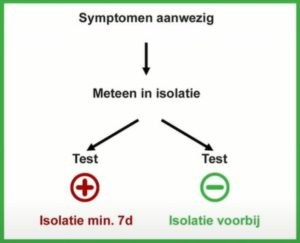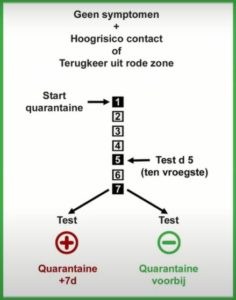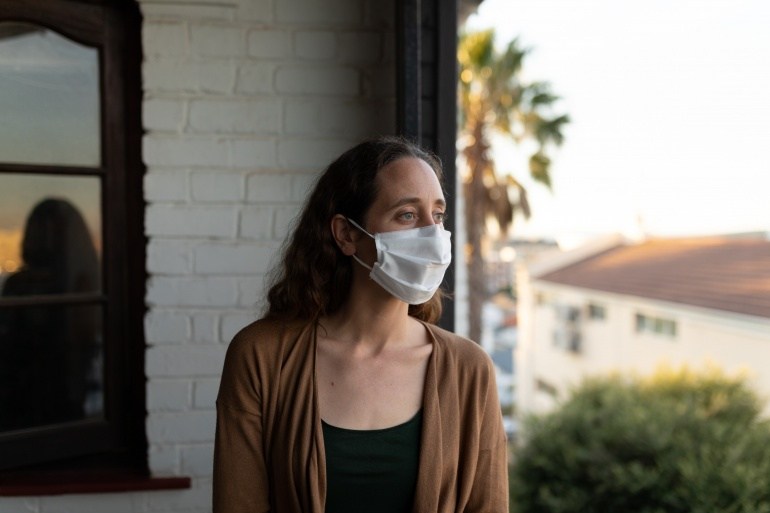Belgium's National Security Council recently announced that from 1 October, the mandatory quarantine period will be shortened from 14 days to only seven, in an effort to make more people adhere to the rules.
The decision was "a compromise between what is scientifically desirable and what is socially feasible," said virologist and inter-federal Covid-19 spokesperson Steven Van Gucht during a press conference on Friday.
From a scientific point of view, 96% of infected people can be identified during a 14-day quarantine. "In principle, this is still the quarantine duration recommended by international organisations such as the World Health Organisation (WHO) and the European CDC," Van Gucht said.
With a 10-day quarantine, 90% of infected people can still be identified. "For a 7-day quarantine, we have to calculate that 50% of the people still have to develop the disease," he said, adding that for half of infected people, symptoms occur somewhere between day 5 and 7 after contact.
In these cases, there is a real chance of infection. "After close contact, there is an incubation period, where you can carry the virus but are not ill. The disease usually occurs between two and 14 days after contact," Van Gucht said.
Symptomatic people

Crisis: National Crisis Centre
People who show symptoms of a Covid-19 infection (sudden diminished sense of smell or taste, sudden fever and sore throat, general flu-like feeling, in combination with a headache, muscle aches and/or general fatigue) must immediately stay at home, and then contact their general practitioner who can decide whether or not they need to be tested.
"If you have symptoms but the test is negative, you do not have Covid-19," said Van Gucht, adding that it people should still stay at home until they no longer feel sick.
"If the test is positive, it is absolutely crucial that you stay in isolation at home for seven days," he said. "It is best to also avoid contact with your housemates as much as possible."
People who want to leave their isolation have to be fever-free for at least three days, and their other symptoms also have to have improved significantly. "For some people, this may mean that their isolation lasts longer than seven days."
Related News
- Belgium reduces quarantine to 7 days from October
- Belgium considers shortening mandatory quarantine period
- Quarantine or isolation: what is the difference?
Asymptomatic people

Credit: National Crisis Centre
People who have no symptoms, but have had a high-risk contact or have just returned from a red travel zone, have to go in quarantine as soon as they have been contacted by contact tracers or immediately after return.
Being a high-risk contact means you have been in contact with an infected person for more than 15 minutes less than 1.5 metres apart, or that you shared objects with an infected person. People living in the same household are usually also regarded as high-risk contacts.
"The 7-day quarantine period starts from the day of the last contact with the infected person, or on the day you leave the red zone," said Van Gucht. "Five days after that, at the earliest, a test can be carried out."
If the test is negative, you may leave quarantine when at least seven days have passed since the last risk contact. "It is important, however, that you are extra cautious and extra attentive during the week following quarantine to any symptoms that may still occur," he said.
"During that week after quarantine, keep your distance from others at all times, especially from vulnerable people. Wear a mask as much as possible, and avoid visiting elderly or vulnerable people."
If, during that week after the 7-day quarantine period, you still develop symptoms, stay at home immediately and get tested again. "After all, there is still a chance that the disease may still break out in that period of 7 to 14 days after contact," Van Gucht said. If that second test is positive, the quarantine will be extended by seven more days.
People who do not have symptoms but were tested anyway, and tested positive, also have to stay in isolation for seven days. "In that case, isolation begins on the day the test is taken."
Once you have tested positive, it does not make sense to repeat the test afterwards, because it can remain positive for several weeks, even though you may no longer be infectious.
Travellers returning from an orange zone no longer have to undergo preventive testing, and also no longer have to go into preventive quarantine. "However, they should still be tested when they develop symptoms, of course," Van Gucht said.
"This pre-isolation of people who have been in close contact with an infected person is one of the most important measures to stop the transmission of the virus," Van Gucht said. "By following the rules for quarantine, we are all ensuring that we can fight Covid-19 better."
Maïthé Chini
The Brussels Times

